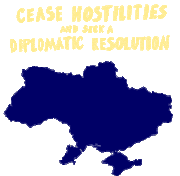|
Cease to Hope posted:These are examples of Trump specifically ordering policies of increasingly indiscriminate bombing and covering up the extent of doing so. As opposed to the very discriminate and cautious carpet bombing of Fallujah in 2004? I'm sure that the white phosphorus they were using to burn people alive in their homes was actually carefully targeted. When the US commanders horrified their British counterparts by telling their men it was a free fire zone the thing that the British didn't realize was that everyone in Fallujah was actually a terrorist already. Anyone seriously trying to argue that Trump's foreign policy represents some "unprecedented" new level of brutality unmatched by previous American presidents is making a faith based argument.
|
|
|
|

|
| # ? May 24, 2024 11:37 |
|
Helsing posted:As opposed to the very discriminate and cautious carpet bombing of Fallujah in 2004? That is a post about 2004 written based on revelations six years later. I even specifically addressed this like one page ago. Cease to Hope posted:I think it's a bit early to assume we fully know the consequences of Trump's foreign policy to boot. Knowing that it's bad and suspecting that it's even worse than we know is different from knowing for a fact how bad it got. Even the harshest critic of Bush didn't know for a fact everything we know now back in 2003. We knew it was bad then, we just didn't specifically know how bad. Evaluating Trump to be worse than Bush because he is openly brutal or careless is not a moral judgement that killing people with ~decorum~ is somehow less bad, but rather using what we do know about Trump to guess at the things we don't know about Trump. That's all we can do, unless you want to adjourn this discussion until 2024 or so.
|
|
|
|
Starting the Iraq War was worse in consequence than anything Trump's done so far, but Trump would likely start a war of his own if given the opportunity, and has done a lot to push Iran into rogue state territory to lay the groundwork whether or not he ever pulls the trigger on it. Aside from starting wars, the man explicitly ran a campaign on torturing people and targeting families of terrorists, and civilian fatalities dutifully rose once he was in power. Now he's worse on Israel than any American president, somehow friendlier than ever with a brutal Saudi ruler despite that, and calling the opposition of his dictator friends terrorists. The US has been willing to work with dictators before, for sure, and at times hostile to democracy when it's been perceived as inconvenient to American interests. Trump seems to be opposed to liberty in the Arab world in principle though, and thinks the people there are savages who have to be managed or killed. https://twitter.com/Volceltaire/status/1123880335677243392 Dr Kool-AIDS fucked around with this message at 23:19 on May 2, 2019 |
|
|
|
Cease to Hope posted:That is a post about 2004 written based on revelations six years later. I even specifically addressed this like one page ago. Are you suggesting that Trump secretly deployed 200,000 American soldiers to the Middle East and we won't know about it until years from now? Because absent something on that scale it would be very difficult for Trump to have matched George W. Bush. Also the only reason I picked Bush was because he's recent enough that everyone here should know better than to praise him. We could just as easily pick a President from the 20th century - Lyndon Johnson or Richard Nixon have lists of international crimes that would make Trump blush. Bill Clinton casually blew up a pharmaceutical plant in Sudan and probably killed at least 50,000 people as a direct result of destroying one of the country's only real sources of medicine. He didn't even need to order a big cover up because the American media and public didn't care enough to be outraged about it outside the predictable lefty circles. The only reason to cling so strongly to the idea that Trump has such a uniquely monstrous foreign policy is the emotional need to see him as fundamentally different from other presidents. Surely we can acknowledge how bad he is without spinning fairy tales about the noble intentions of democratic champions like George W. Bush.
|
|
|
|
 An LNA division badge or insignia, on a vehicle captured by the GNA outside Tripoli. It's kinda rad. Battle for Tripoli still doesn't seem to be going anywhere. GNA and LNA are taking the fight to the oil industry and banks now. Situation is really stupid, Haftar controls most of the oil fields, but the GNA controls the banks which take international payment. I think the LNA is still getting paid though, from the banks in Tripoli? If the GNA cut cash flow to the East he could cut oil production, which would result in everyone getting screwed. I'm not sure how all this stuff works but I'm sure its stupid.
|
|
|
|
Helsing posted:Surely we can acknowledge how bad he is without spinning fairy tales about the noble intentions of democratic champions like George W. Bush. I don't think people in this thread are spinning fairy tales about whatever. People are laying Yemen and Syria and Pakistan (and Somalia, albeit not recently in this thread) at Trump's feet, based on guessing how bad things are from sketchy evidence, or saying that Trump's naked indifference/bloodlust are a green light to dictators who previously felt that America's lip service to democracy meant that overt oppression was risky. (Trying to be fair to eg Sinteres's argument here, even though I don't find it very convincing.) I don't think you speculating about how everyone is deranged by a need to justify their hate of Trump is helpful, especially since that same rhetoric was deployed to defend Bush.
|
|
|
|
Cease to Hope posted:I don't think people in this thread are spinning fairy tales about whatever. This is a comforting lie you're telling yourself so that you can pretend that your outrage against Trump's foreign policy is based on genuine moral outrage and not partisan frustration. I'll try to stop repeating myself at this point because it doesn't seem like there's much left to say.
|
|
|
|
V. Illych L. posted:but obama actively and intelligently helping in the quashing of democratic movements in e.g. egypt is also worse. This is completely false. I'm not sure where the impression that a Muslim Brotherhood government was something the Obama administration wanted to avoid comes from, nor do I understand what steps the Obama administration took to help in any of the events that transpired in 2013. If you're arguing the Americans gave the Egyptian military the weapons used to quash the protests in 2013, the US military aid to Egypt is a fraction of Egypt's military/police spending and is mainly used as a subsidy for American weapon platform producers, churning out more Abrams, Apaches and F-16s; none of which are used in quashing democratic movements. If you're arguing that the aid represents implicit support to the Egyptian government, the Obama administration withheld aid payments for a significant amount of time following the Rab'aa dispersal, with chunks of the aid being released related to equipment used in fighting the insurgency in the Sinai, and the remaining chunks withheld till Sisi produced meaningful civil rights/human rights actions. If you're arguing that the Obama administration cutting off aid would have helped maintain democratic institutions in Egypt, I'd like to introduce you to Mohamed bin Zayed and Mohamed bin Salman. Regarding this pedantic argument on morals in US foreign policy, this thread has a tendency to be self-centered on the US as the only actor with agency. As explained above, no matter what the US did, short of arranging economic sanctions on a 40% below poverty line country that they somehow convince the Saudis and Emiratis to stick to, or an actual invasion, the US held no cards in this game; and they hold less cards in other middle eastern countries. Helsing posted:This is a comforting lie you're telling yourself so that you can pretend that your outrage against Trump's foreign policy is based on genuine moral outrage and not partisan frustration. I'll try to stop repeating myself at this point because it doesn't seem like there's much left to say. You are factually incorrect. Sisi in Egypt was almost convinced into easing human rights and non-profit organisation laws in Egypt through the Obama administration's policies towards him, something Trump reversed on coming to power. Ham fucked around with this message at 03:34 on May 3, 2019 |
|
|
|
thanks Ham, I'm not as up on Egypt as I should be
|
|
|
|
Helsing posted:I guess it depends on how you define "backed", which is inherently a vague term, but why do you think it's implausible to imagine that the US recognized that Mubarak's position was untenable and therefore offered tacit encouragement to get rid of him but then, upon realizing that their preferred factions weren't going to be competitive in a democracy, decided it was better to have the military return to power with a new strongman? Because that's not what happened? Relying on your imagination to conjure up a fantasy of how world history played out isn't exactly a scientific method and that's why it's so hard to take people like you seriously. Sisi rode a wave of Egyptian nationalism into power. As it turns out, Egyptian nationalists aren't exactly the most pro-American bunch! The ambassador to Egypt, Anne Patterson, called for the protesters demanding Morsi's removal to take it easy, and people took that as the US being in the corner of the Muslim Brotherhood and trying to influence Egypt's internal affairs. Put another way, one of the major talking points that enabled the coup directly contradicts your framing of how things played out. She was a reviled figure in the country, and Americans, and foreigners in general, were not safe showing their faces around the protests because it was quite possible they would be attacked. Some were murdered, and the US sent some embassy staff home, and closed during business hours. The case of this Egyptian anti-imperialism is a prime example that having anti-Americanism as a pillar of your ideology doesn't inherently make you right and moral. You can justify heinous poo poo in the name of opposing the US, just as the US did in the name of opposing communism. It doesn't matter if you recognize that Bush's administration was a human rights disaster. You still have an obligation to put in the work in to learn what the gently caress you're talking about before you start going around acting like you know everything, or your worldview can still very well end up in a bad place. Edit: I mean I can't not post this old gem along with this argument. https://www.youtube.com/watch?v=GcXXy-Jb6wU Volkerball fucked around with this message at 04:35 on May 3, 2019 |
|
|
|
I’m glad you are coming around to Sinteres point of view, after all this time.
|
|
|
|
People are accusing him of being a dubya fanboy so I'd say it's more like he's coming around to mine. 
|
|
|
|
Volkerball posted:People are accusing him of being a dubya fanboy so I'd say it's more like he's coming around to mine. Sounds like my choice to skip the last page was correct.
|
|
|
|
Ham posted:You are factually incorrect. Sisi in Egypt was almost convinced into easing human rights and non-profit organisation laws in Egypt through the Obama administration's policies towards him, something Trump reversed on coming to power. "almost" If I were going to focus on one good thing the Obama administration did that was unequivocally better than his predecessor and his successor, I'd probably focus on the Iran deal, which was at least implemented for a little while and not just something that his administration "almost" did. And like I said before, trying to call a pivot away from an Obama era policy "unprecedented" sort of overlooks the fact that immediately preceding Obama were eight years of George W. Bush. Volkerball posted:Because that's not what happened? Relying on your imagination to conjure up a fantasy of how world history played out isn't exactly a scientific method and that's why it's so hard to take people like you seriously. Sisi rode a wave of Egyptian nationalism into power. As it turns out, Egyptian nationalists aren't exactly the most pro-American bunch! The ambassador to Egypt, Anne Patterson, called for the protesters demanding Morsi's removal to take it easy, and people took that as the US being in the corner of the Muslim Brotherhood and trying to influence Egypt's internal affairs. Put another way, one of the major talking points that enabled the coup directly contradicts your framing of how things played out. She was a reviled figure in the country, and Americans, and foreigners in general, were not safe showing their faces around the protests because it was quite possible they would be attacked. Some were murdered, and the US sent some embassy staff home, and closed during business hours. The case of this Egyptian anti-imperialism is a prime example that having anti-Americanism as a pillar of your ideology doesn't inherently make you right and moral. You can justify heinous poo poo in the name of opposing the US, just as the US did in the name of opposing communism. It doesn't matter if you recognize that Bush's administration was a human rights disaster. You still have an obligation to put in the work in to learn what the gently caress you're talking about before you start going around acting like you know everything, or your worldview can still very well end up in a bad place. This is a very selective presentation of events that brushes over some important details. A fuller accounting of what happened actually helps demonstrate why any one administration or handful of people are not match for the US foreign policy blob. Obama - whose support for Morsi was not nearly as strong as you imply, but who did at least seemingly try to work out some kind of compromise arrangement - may have been the President, but he was no match for entire US foreign polciy establishment plus its regional allies, almost all of whom were opposed to Morsi. Guess who won out? And its worth emphasizing that Obama's internal opponents including senior Democrats in his own cabinet as well as Pentagon officials. And while Obama is perhaps the least villainous major figure in this story, that's mostly because he comes off as inept and overmatched by the reality of American empire. The guy sounds about as clueless here as he did when he was trying to find common ground with the Republicans on domestic issues. The New York Times posted:The White House and the Strongman If anything this story is a really great illustration of why basing your entire analysis of American foreign policy on the personaltiy of the President is deeply irrational and will lead you into all kinds of errors.
|
|
|
|
Helsing posted:"almost" Your claim was that Morsi was unfriendly to the US. So unfriendly that the US manufactured a coup against him to put a more friendly strongman in place, because their (as of yet unnamed) proxy faction lost the election. Your argument here and the attached article don't help your case or even allude to it. What happened in Egypt was Egyptian. No international actor was playing the part of puppet master. Everyone was just predicting what would happen and jockeying for the best position in a very chaotic month. They were reacting to events, not causing them, which is the case a lot of the time when imagination would say otherwise. A lot of people within Obama's administration had different views about how to react, absolutely. That's what happens in a democracy. When multiple personalities push and pull in different directions, the end result can often look schizophrenic if the issue is controversial and divisive, and an administration can't unite behind one path. That this phenomenon exists is in no way an indication that Reagan's brain is alive on life support somewhere and will call the shots on US foreign policy as the God-King of the deep state eternally. To make your case, you're holding up a quote from Ben Rhodes. Rhodes full time job was to weave pro-Obama talking points into the media. There's huge articles out detailing his role in the Obama administration. Of course he claims Obama was just a poor helpless sap along for the ride, because the alternative is that he would have to wear what amounted in a big chunk of the public eye to a dictator overthrowing a democracy. But the fact is that he does have to wear the US response to the coup in Egypt, because it was his administrations response. Not all of that response is negative, not all is positive, but it was absolutely his response. You're countering with the positions of Hagel and Kerry, but both of them were directly appointed by Obama, and the extent of their power isn't solely left to the realm of imagination. Kerry in particular rarely got his way within the Obama administration and raged about it on a few occasions. He looked like a drat fool when he was pushing for airstrikes in Syria following the Ghouta attack, and Obama supported him all the way up until he didn't, and Kerry was left holding a bag of poo poo. These were hardly fixed figures of American empire that Obama was powerless in the face of. His response to the events in Egypt didn't look that much different than his response to the Arab Spring before either of those two were appointed. The guiding principle throughout his presidency when it came to reacting to foreign crises was security-centric, and the goal was always primarily to weather the storm rather than seize opportunities to to stand against fascism and dictatorship. "Don't do stupid poo poo," as he put it. In essence, that bad action was always worse than inaction, so reduced action was the most surefire way to reduce risk. You can love it or hate it, but there's no doubt that it was his MO, and that a presidents MO can be clearly seen in US foreign policy while he is in office. Volkerball fucked around with this message at 20:51 on May 3, 2019 |
|
|
|
Volkerball posted:Your claim was that Morsi was unfriendly to the US. So unfriendly that the US manufactured a coup against him to put a more friendly strongman in place, because their (as of yet unnamed) proxy faction lost the election. Your argument here and the attached article don't help your case or even allude to it. What happened in Egypt was Egyptian. No international actor was playing the part of puppet master. Everyone was just predicting what would happen and jockeying for the best position in a very chaotic month. They were reacting to events, not causing them, which is the case a lot of the time when imagination would say otherwise. A lot of people within Obama's administration had different views about how to react, absolutely. That's what happens in a democracy. When multiple personalities push and pull in different directions, the end result can often look schizophrenic if the issue is controversial and divisive, and an administration can't unite behind one path. That this phenomenon exists is in no way an indication that Reagan's brain is alive on life support somewhere and will call the shots on US foreign policy as the God-King of the deep state eternally. The United States did not "manufacture" a coup in Egypt, nor do I think the United States was playing the role of puppet master and meticulously orchestrating everything that happened. The nature of America's relationship with Egypt and other regional powers also happens to make that kind of direct interference unnecessary. I actually think the way you describe things here is a perfectly adequate description of events and fits quite well with my initial description. The Obama administration didn't have a clear vision of what it wanted from Egypt, which lead to a lot of confusion, and ultimately the US defaulted back to its generic position of support for the military because, regardless of how an individual President might feel about the Egyptian government, that fundamental relationship is far too important to American geopolitical interests to jeopardize. As far as America's preferred outcome, I think Obama's comment here gives a reasonably good summary of his thinking: Reuters posted:“So it’s important for us not to say that our only two options are either the Muslim Brotherhood, or a suppressed Egyptian people,” he said. Once it started to look like actually the only options would indeed be either the Muslim Brotherhood or a suppressed Egyptian people the United States made peace with that fact. quote:To make your case, you're holding up a quote from Ben Rhodes. Rhodes full time job was to weave pro-Obama talking points into the media. There's huge articles out detailing his role in the Obama administration. Of course he claims Obama was just a poor helpless sap along for the ride, because the alternative is that he would have to wear what amounted in a big chunk of the public eye to a dictator overthrowing a democracy. But the fact is that he does have to wear the US response to the coup in Egypt, because it was his administrations response. Not all of that response is negative, not all is positive, but it was absolutely his response. You're countering with the positions of Hagel and Kerry, but both of them were directly appointed by Obama, and the extent of their power isn't solely left to the realm of imagination. Kerry in particular rarely got his way within the Obama administration and raged about it on a few occasions. He looked like a drat fool when he was pushing for airstrikes in Syria following the Ghouta attack, and Obama supported him all the way up until he didn't, and Kerry was left holding a bag of poo poo. These were hardly fixed figures of American empire that Obama was powerless in the face of. His response to the events in Egypt didn't look that much different than his response to the Arab Spring before either of those two were appointed. The guiding principle throughout his presidency when it came to reacting to foreign crises was security-centric, and the goal was always primarily to weather the storm rather than seize opportunities to to stand against fascism and dictatorship. "Don't do stupid poo poo," as he put it. In essence, that bad action was always worse than inaction, so reduced action was the most surefire way to reduce risk. You can love it or hate it, but there's no doubt that it was his MO, and that a presidents MO can be clearly seen in US foreign policy while he is in office. The fact that the most consequential thing Obama did as President was to occasionally restrain the most aggressive instincts of his own advisers and cabinet - while still blowing up several new countries in the process - is a very strong indicator that the fundamentals of American foreign policy do not tend to change that much from one administration to the next. George W. Bush certainly represented an escalation in terms of American involvement but since then both Obama and Trump have mostly been tinkering with the gigantic mess that Bush left for them. You can certainly identify differences of style or focus from one administration to the next but none of these differences are such that it would be sensible to call Donald Trump's blood thirstiness "unprecedented". For a more rigorous and scholarly account of this persistence in foreign policy I'd recommend people check out this monograph.
|
|
|
|
The TFSA have launched a new offensive against what's left of the YPG-held territory in northwestern Syria and seem to have captured some villages. My guess would be that the timing here has as much to do with Turkey's frustration with Russia and the regime's constant bombardment (and presumably eventual invasion) of Idlib as it does with the continued desire to wipe out the YPG, but it'll be interesting to see where the line ends up being drawn here. The regime obviously has incentives to work with the YPG to keep Tal Rifaat free from Turkish control, both because Turkey's a bigger long-term threat to Syrian territorial integrity, and because the regime's ability to essentially hold Tal Rifaat hostage presumably gives them at least a little leverage over the YPG in Rojava. Aside from long-term considerations like the reunification of the country which the regime would obviously like to see if/when the US finally withdraws, that kind of leverage could have short-term significance when it comes to oil as the US works to choke off supplies to the regime (which was obviously the goal when the US rushed the Kurds down to seize the oil fields from ISIS as the regime was capturing DeZ).
|
|
|
|
Since then, regime forces have started a ground assault against rebel positions in Hama, and have reinforced the area around Tal Rifaat, while the TFSA incursion against the YPG seems to have been thus far successfully blunted or even repelled.
|
|
|
|
Man this thread's dead when I'm triple posting across four different days. Anyway, Trump pardoned an American soldier who murdered an Iraqi who he suspected of being involved in an explosion that killed two other soldiers. Obviously the message Trump is trying to send is that he's a badass who supports the troops no matter what, and it lines up with his campaign rhetoric about supporting torture and worse, but I don't know how the Iraqi government can view this as anything other than a sign that American forces need to get the gently caress out of the country. If Americans are going to be pardoned even in the rare instances that American military courts find them guilty, it's hard to take any promises of accountability seriously. https://www.cnn.com/2019/05/06/politics/trump-pardon-us-soldier-iraq/index.html
|
|
|
|
Sinteres posted:Man this thread's dead when I'm triple posting across four different days. Anyway, Trump pardoned an American soldier who murdered an Iraqi who he suspected of being involved in an explosion that killed two other soldiers. Obviously the message Trump is trying to send is that he's a badass who supports the troops no matter what, and it lines up with his campaign rhetoric about supporting torture and worse, but I don't know how the Iraqi government can view this as anything other than a sign that American forces need to get the gently caress out of the country. If Americans are going to be pardoned even in the rare instances that American military courts find them guilty, it's hard to take any promises of accountability seriously. Thanks for keeping it up to date, thread has a lot of lurkers.
|
|
|
|
Ham posted:Thanks for keeping it up to date, thread has a lot of lurkers. Agreed!
|
|
|
|
Iyad El-Baghdadi is one of my favorite Arab democratic activists, and is currently living in Norway. He got a visit from police a couple weeks ago, who said they had a credible threat against him by the Saudi government. They took him to a secure location. He's been tweeting today. https://www.theguardian.com/us-news/2019/may/07/cia-warns-arab-activist-of-potential-threat-from-saudi-arabia Thread here. https://twitter.com/iyad_elbaghdadi/status/1125812671859838976 In Syria, it seems a regime assault on some of Idlib could be in the works. Over the last two weeks the bombing campaign there has significantly increased, and in the last week in particular. I've seen reports of 10 hospitals hit, 100+ dead, and tens of thousands displaced already. Similar carpet bombing strategies were employed in Jobar, Aleppo, and many others prior to invasions against them, although it has been anywhere between months and years before the regime finally made a move on the ground in those situations. https://twitter.com/leloveluck/status/1125638762975977472 Volkerball fucked around with this message at 18:35 on May 7, 2019 |
|
|
|
This video caught 3 munitions dropped on the entrance to Hass underground hospital, which was previously attacked in September when there was another spate of hospital bombings: https://www.youtube.com/watch?v=IWOELkf2Yo8 The co-ordinates of some of the hospitals targeted had been shared with the UN, which would have then shared them with the Russians and Syrians so they wouldn't be targeted, so they knew exactly what they were hitting.
|
|
|
|
And Iran is finally started to exit commitments to the Iran deal, a year after this was violated by the US. https://www.bbc.co.uk/news/world-middle-east-48197628
|
|
|
|
yeah, no reason for us to stay in any deal if we're gonna get regime changed regardless e: what, with the us deploying ships trying to provoke iran to shoot first, and the eu's instex probably being a big wet fart that does nothing spaceships fucked around with this message at 12:56 on May 8, 2019 |
|
|
|
We've just launched a new Yemen project at Bellingcat: https://www.youtube.com/watch?v=yv6Nx6eHO3o We're starting by examining 100 air strikes by the Saudi Coalition, using an investigation and archiving process developed with the Global Legal Action Network that meets the standards required for our investigations and the open source material we preserve to be used in court. The first case will be in UK courts challenging the export of arms to Saudi Arabia, using open source evidence and analysis, along with other evidence from groups working on the ground, to show export agreements have been violated. We'll be adding the air strike investigations we've completed to this site over the coming weeks, plus sharing the material we've used in the investigations in a searchable online database. We've also been involved with the EUArms project, which has been working with journalists across Europe to examine arms exports, with the most recent investigation, published today, looking at Belgian arms exports, with a particular focus on exports to Saudi Arabia: quote:"Saudis using Belgian weapons in Yemen" There's a thread with more details here: https://twitter.com/BenDoBrown/status/1126005371410235393
|
|
|
|
Why are Belgian Govts being post-colonial dickbags still?
|
|
|
|
Brown Moses posted:We've just launched a new Yemen project at Bellingcat: This is awesome.
|
|
|
|
Grouchio posted:Why are Belgian Govts being post-colonial dickbags still? Because it makes them money and the only incentive they have to stop is ???
|
|
|
|
Brown Moses posted:We've just launched a new Yemen project at Bellingcat: This is a good project.
|
|
|
|
Grouchio posted:Why are Belgian Govts being post-colonial dickbags still?
|
|
|
|
Toplowtech posted:Post-colonialism?
|
|
|
|
https://twitter.com/Reuters/status/1125920911289397249?s=19 More forces being moved to the Middle East https://twitter.com/thekarami/status/1125864087290671104?s=19 You know I thought that reasoning sounded familiar.
|
|
|
|
Iran will be an absolute utter shitshow but it will start some really interesting things in the US if it happens. Even chuds are sick of middle east forever war and we would be getting into the great granddaddy of one Even right wing media in the US, while still backing regime change and decrying them as an enemy of the US, doesn't constantly go frothing at the bit to attack them or build them up as some ultimate Great Satan figure like they do with Venezuela. Bolton can come up with a CB but I don't think the nation itself is really going to care about it Feldegast42 fucked around with this message at 17:49 on May 8, 2019 |
|
|
|
Get ready for another round of foreverwar.
|
|
|
|
Yeah that's a good way of describing what would happened (god forbid). People who think this would go domestically just like Iraq 2003 aren't really paying attention.
|
|
|
|
Grape posted:Yeah that's a good way of describing what would happened (god forbid). so, about ur foreign policy players atm
|
|
|
|
The big difference domestically between Iraq and Iran is that Iran won't be riding on the coat tails of the largest, extremely traumatizing and deftly-exploited act of terrorism committed against American civilians. There will not be a moment of 'coming together' or even a general cultural frenzy of bloodlust, fear or credulity. Few Dems will trip over their own dicks trying to support this undertaking, especially because its inherently associated with Trump (not because they're not warmongers or have any real moral compass). The few leftist Dems will probably hammer this poo poo on social media harder than W was hammered by the few Dems who opposed the Iraq war. That is... unless Trump/Bolton stage some kind of false flag poo poo to reproduce the feels of 9/11 (I'm not implying that 9/11 was a FF), but I sort of doubt they'll be able to pull it off. Pembroke Fuse fucked around with this message at 18:56 on May 8, 2019 |
|
|
|
Pembroke Fuse posted:This is a good project. Our aim is once we've got the processes for archiving and investigation running smoothly we'll package them up so they can be deployed internally to other situations, and shared with other organisations who want to do the same sort of investigation. We've already got a lot of interest from various NGOs work on Yemen and advocacy work for using the information, hopefully in the long term we'll be able to show them how to do it themselves. The idea is we start doing this from day one of a conflict, not year 5.
|
|
|
|

|
| # ? May 24, 2024 11:37 |
|
Bolton is totally trying to pull off his own Gulf of Tonkin, baiting Iran into responding to provocations by inflicting American casualties.
|
|
|



























